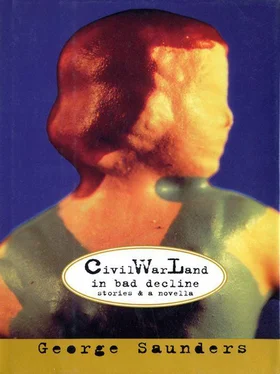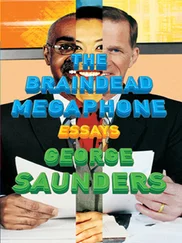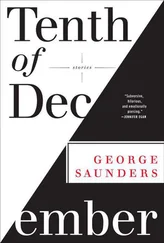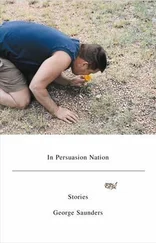Wonderful, I think, you’ve fouled your own four-hundred-dollar module. And I have. So I trash it. I write it off to grief management. I go to lunch. I opt for an autodispensed FreightFurter. Of course I overmicrowave and the paper cowcatcher melds with the bun and the little engineer’s face runs down his overalls. It’s even more inedible than usual. I chuck it. I can’t afford another. I chuck it and go wait for my regulars.
At two Mr. Bomphil comes in looking guilty and as always requests Violated Prom Queen, then puts on high heels and selects Treadmill Three. Treadmill Three is behind a beam, so he’s free to get as worked up as he likes, which is very. I try not to hear him moan. I try not to hear him call each football-team member by name. He’s followed by Theo Kiley, an appliance salesman who lays down a ream of Frigidaire specs and asks for Legendary American Killers Stalk You. I strap on his headset. I insert his module. For twenty minutes he hems and haws with Clyde Barrow. Finally he slips up and succumbs to a burst of machine-gun fire, then treats himself to a Sprite. “Whew,” he says. “Next time I’ll know to avoid the topic of his mom.” I remind him he’s got an outstanding bill. He says thanks. He says his bill and his ability to match wits with great criminals are the only outstanding things he’s got. We laugh. We laugh some more. He shakes his head and leaves. I curse him under my breath, then close up early and return to my lonely home.
Next day Mrs. Gaither from Corporate comes to town. Midway through my Significant Accomplishments Assessment, armless Mr. Feltriggi comes to the door and as usual rings the bell with his face. I let him in and he unloads his totebag of cookbooks for sale. Today it’s “Crazy Cajun Carnival” and “Going Bananas with Bananas: A Caribbean Primer.” But I know what he really wants. With my eyes I tell him wait. Finally Gaither finishes raking my sub-par Disbursement Ledger over the coals and goes across the mall to O My God for some vintage religious statuary. I slip the headset on Feltriggi and run Youth Roams Kansas Hometown, 1932. It’s all homemade bread and dirt roads and affable dogcatchers. What a sweet grin appears. He greets each hometowner with his ghost limbs and beams at the chirping of the holographic birds. He kneels awhile in Mrs. Lawler’s larder, sniffing spices that remind him of his mother elbow-deep in flour. He drifts out to the shaded yard and discusses Fascism with the iceman near some swaying wheat. His posture changes for the better. He laughs aloud. He’s young again and the thresher has yet to claim his arms.
Gaither comes back with a Saint Sebastian cookie jar. I nudge Feltriggi and tell him that’s all for today. I take off his headset and he offers me a cookbook in payment. I tell him forget it. I tell him that’s what friends are for. It’s seventy bucks a session and he knows it. He rams his head into my chest as a sign of affection.
“That type of a presence surely acts to deflate revenues,” Gaither says primly as Feltriggi goes out.
“No lie,” I say. “That’s why I nearly beat him up every time he comes in here.”
“I’m not sure that’s appropriate,” she says.
“Me neither,” I say. “That’s why I usually don’t really do it.”
“I see,” she says. “Let’s talk briefly about personal tragedy. No one’s immune. But at what point must mourning cease? In your case, apparently never.”
I think: You never saw Elizabeth lanky and tan and laughing in Napa.
“I like your cookie jar,” I say.
“Very well,” she says, “seal your own doom.”
She says she’s shocked at the dryness of my treadmill bearings and asks if I’ve ever heard of oil. She sighs and gives me her number at the Quality Inn in case I think of anything that might argue against Franchise Agreement Cancellation. Then out she goes, sadly shaking her head.
It’s only my livelihood. It’s only every cent Elizabeth left me. I load up my mobile pack. I select my happiest modules. Then I go off to my real job, my penance, my albatross.
Rockettown’s our ghetto. It’s called Rockettown because long ago they put up a building there in which to build rockets. But none were built and the building’s now nothing, which is what it’s always been, except for a fenced-off dank corner that was once used to store dilapidated fireplugs and is now a filthy day-care for the children of parents who could care less. All around Rockettown little houses went up when it was thought the building would soon be full of people making rockets and hauling down impressive wages. They’re bad little houses, put up quick, and now all the people who were young and had hoped to build rockets are old and doddering and walk by the empty building mumbling why why why.
In the early days of my grief Father Luther told me to lose myself in service by contacting Elder Aid, Inc. I got Mrs. Ken Schwartz. Mrs. Ken Schwartz lives in Rockettown. She lives in Rockettown remembering Mr. Ken Schwartz and cursing him for staying so late at Menlo’s TenPin on nights when she forgets he’s been dead eighteen years. Mrs. Ken Schwartz likes me and my happy modules. Especially she likes Viennese Waltz. Boy does she. She’s bedridden and lonely and sometimes in her excitement bruises her arms on her headboard when the orchestra starts to play. Tonight she says she’s feeling weak. She says she used to be a different person and wishes she could go back to the days when she was loved. She mourns Fat Patrice and their jovial games of Old Maid. She mourns the front-yard oak the city felled without asking her. Mostly she mourns Mr. Ken Schwartz.
I pull out all the stops. I set Color on high contrast. I tape sensors to her lips and earlobes. I activate the Royalty Subroutine. Soon the prince is lavishing her with praise. Soon they’re sneaking off from the ball for some tender words and a kiss or two on a stone bench beside the Danube. Soon I’m daubing her eyes with tissue while she weeps at the beauty of the fishermen bowing from their little boats as they realize it’s the prince himself trying to retrieve her corsage from the river.
I make tea. I read my magazine. Finally I stroke her forehead while humming Strauss and slowly fading the volume.
“You,” she says, smiling sweetly when she’s all the way back. “You’re too good to me.”
“No one could be too good to you,” I say.
“Oh you,” she says. “You’re a saint.”
No, I think, I’m a man without a life, due to you. Then I feel ashamed and purposely bash my shin against the bedframe while tucking her in. I get her some juice. I check her backdoor lock. All around the room are dirty plates I’ve failed to get to the sink and old photos of Mr. Ken Schwartz assessing the condition of massive steamboilers while laughing confidently.
Out on the street it’s cold and a wino’s standing in a Dumpster calling a stray cat Uncle Chuck. I hustle directly to my Omni, fearing for my gear. I drive through frightening quarters of the city, nervously toggling my defrost lever, thinking of Mrs. Schwartz. The last few months she’s gone downhill. She’s unable to feed herself or autonomously use the bathroom. Talk about losing yourself in service to a greater extent than planned. She needs a live-in, but they don’t come cheap, and my shop hasn’t turned a profit in months. What to do? I think and think. I think so much I lose track of where I am and blunder by The Spot. You fool, I think, you ass, how much additional pain would you like? Here a drunk named Tom Clifton brought his Coupe De Ville onto the sidewalk as Elizabeth shopped for fruit on the evening of a day when we’d fought like hell. On the evening of a day when I’d called her an awful name. What name? I can’t say the word. I even think it and my gut burns.
Читать дальше












